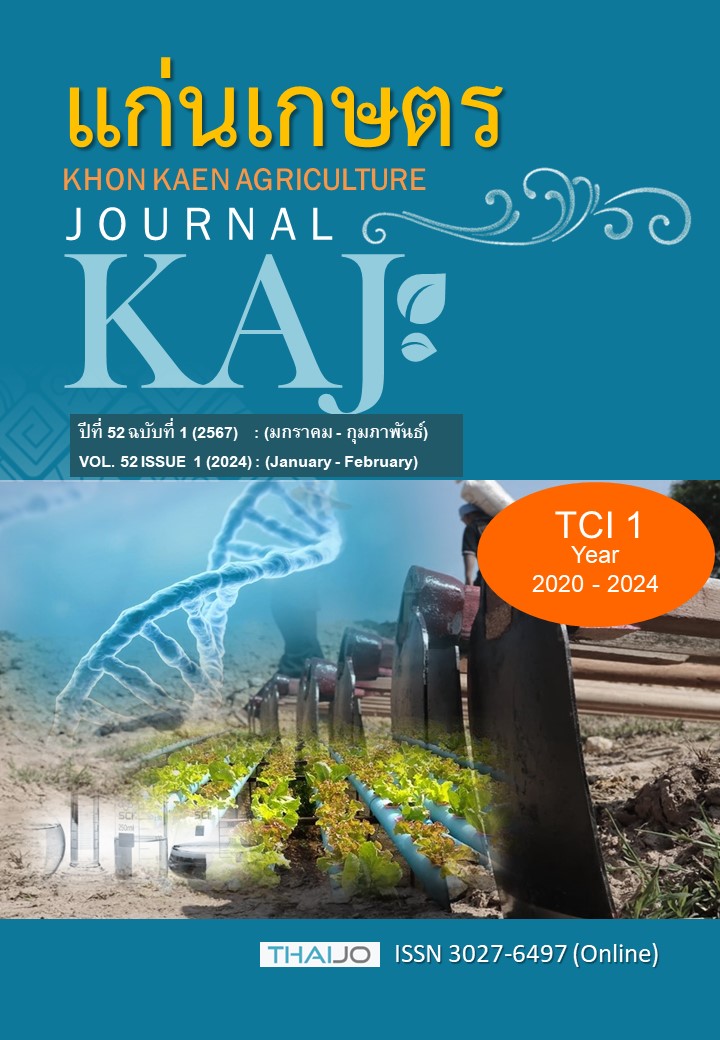The study of the effect on soil fertility and Arabica coffee seed quality under monoculture and integrated farming in Ban Pang Khon, Chiang Rai Province
Main Article Content
บทคัดย่อ
This research aimed to study the soil properties and the quality of Arabica coffee seeds of the Catimor variety under the agroforestry system with temperate fruit trees in a naturally regenerated mixed and monoculture area at Ban Pang Khon. It was focused on promoting high-quality coffee cultivation in highland areas and maintaining sustainable environmental systems. Randomly arranged sample plots of size 50x20 square meters were established. Soil samples were collected from the same level of depth (0-15 cm) in both monoculture and agroforestry areas. Coffee seeds were randomly collected from each plot, totaling 600 seeds per plot. The results showed that the soil of the single-crop coffee garden is loamy sand, while the mixed-crop soil is a loam soil mixed with sand. The soils in the monoculture and agroforestry areas were slightly acidic to moderately acidic (pH 5.42-5.35). The electrical conductivity (EC) of the soil was between 25.79-27.61 μS/cm, indicating a non-saline soil. The organic matter content (%OM) in the soil ranged from 6.55% to 6.08%. The organic carbon content (%OC) was high, with main nutrient levels: N = 0.38-0.50%, P = 10.37-14.43 mg/kg, and K = 215.04-508.95 mg/kg. The cation exchange capacity (CEC) ranged from 18.53 to 20.22 meq/100g. Soils from the agroforestry area exhibited higher CEC and moisture content compared to monoculture soils, indicating the ability to retain nutrients in the soil and higher soil fertility. Fresh coffee beans from the agroforestry area contained 1,082.56 mg/kg of caffeine, 188.09 mg Gallic acid/g dry weight (DW) of total phenolic compounds, and higher antioxidant activity than coffee beans from the monoculture area, which contained 783.43 mg/kg of caffeine, 135.54 mg Gallic acid/g DW of total phenolic compounds, and 8.60 mg Vitamin C/g DW. Therefore, the agroforestry system for Arabica coffee cultivation has positive effects on soil properties and soil
Article Details

อนุญาตภายใต้เงื่อนไข Creative Commons Attribution-NonCommercial-NoDerivatives 4.0 International License.
เอกสารอ้างอิง
Bunlomrak, E. 2014. Factors Affecting the Adoption of Good Agricultural Practices among Coffee Growers in Pa Pae Subdistrict, Mae Taeng District, Chiang Mai Province. Independent Study of Master's Degree in Agricultural Promotion, Department of Agriculture, Faculty of Agriculture, Chiang Mai University, Chiang Mai.
Bunma, W. 2001. Returns of intercropping with Arabica coffee in the first to third years. Journal of Agriculture. 17:
-221.
Chiaoruenrom, E. 2014. Laboratory Manual for Soil Survey. 6th Edition. Department of Soil Science, Faculty of Agriculture, Kasetsart University, Bangkok.
Inkhawng, P., and S. Meepunlum. 2014. Study of Factors Related to Suitable Areas for Arabica Coffee Cultivation: A Case Study of Mae Soi District, Chiang Rai Province. Master's Thesis in Geography, Naresuan University.
Kamon, P., and T. Prommongkol. 2002. Agroforestry System of Arabica Coffee Cultivation with Other Plants for Highland Natural Resource Conservation. Highland Research and Training Center, Faculty of Agriculture, Chiang Mai University, Chiang Mai.
Luesaksak, N., N. Angkarak, F. Chaiwan, and S. Kamyong. 2021. Soil characteristics in an agroforestry system with coffee as the main crop in Chiang Mai Province. Khon Kaen Agriculture Journal. 1: 49-63.
Suwannawisalkij, P. 2008. Efficiency of Arabica Coffee Production in the Northern Region. Highland Research and Training Center, Faculty of Agriculture, Chiang Mai University, Chiang Mai.
Suwannawong, W. 2013. Environmental impact of highland agricultural activities on carbon accumulation, nutrient elements, and water in Pampa Subdistrict, Mae Taeng District, Chiang Mai Province. Master's Thesis, Chiang Mai University, Chiang Mai.
Tansuchart, R., C. Parnmee, and K. Kunnasri. 2015. A Study on the Competitiveness of Environmentally Friendly Arabica Coffee Produced by Cooperative Groups. In Complete Report. Highland Research and Development Institute (Public Organization).
Thongsri, K. 2565. Effects of Different Forest Conditions on the Quality of Arabica Coffee (Coffea arabica L.) Beans Grown in the Royal Project Area of Ban Khun Tae, Doi Kaeo Subdistrict, Chom Thong District, Chiang Mai Province. Master's Thesis in Crop Science, Faculty of Agriculture, Maejo University, Chiang Mai.
Van der Vossen, H.A.M. 1988. Physiological aspects of coffee in agro-forestry systems. Proceedings, International Seminar on Coffee Technology held on February 3-5, 1988 at Chiangmai Orchid Hotel, organized by Highland Coffee Research and Development Centre, Faculty of Agriculture, Chiangmai University, Chiangmai. p. 53-6.


